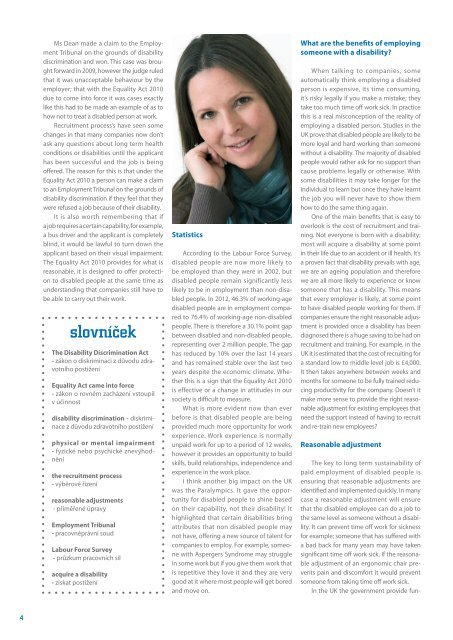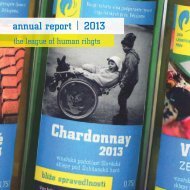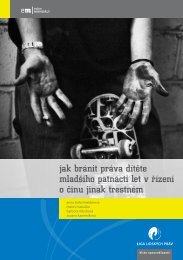EXTRA ligové noviny | číslo 8 | léto 2013| Zaměstnávání lidí s postižením
Osmé číslo EXTRA ligových novin věnujeme tématu zaměstnávání lidí s postižením - přináší informace o všech aktivitách Ligy lidských práv v této oblasti za poslední tři roky. - úvodník právníka Petra Hansliana – Práce na férovku - článek Tobi Manikin-Collet - Employment of people with disabilities in the UK - informace o našem dlouholetém projektu Férové zaměstnávání - recenzi na metodiku Jde to! Jak na zaměstnávání lidí s postižením - rozhovor s Helenou - hlavní hrdnikou dokumentárního filmu Ploty - "easy to read" článek Hledáte práci? plný informací pro lidi se zdravotním postižením - tipy a rady, kde najít další informace o této protblematice
Osmé číslo EXTRA ligových novin věnujeme tématu zaměstnávání lidí s postižením - přináší informace o všech aktivitách Ligy lidských práv v této oblasti za poslední tři roky.
- úvodník právníka Petra Hansliana – Práce na férovku
- článek Tobi Manikin-Collet - Employment of people with disabilities in the UK
- informace o našem dlouholetém projektu Férové zaměstnávání
- recenzi na metodiku Jde to! Jak na zaměstnávání lidí s postižením
- rozhovor s Helenou - hlavní hrdnikou dokumentárního filmu Ploty
- "easy to read" článek Hledáte práci? plný informací pro lidi se zdravotním postižením
- tipy a rady, kde najít další informace o této protblematice
You also want an ePaper? Increase the reach of your titles
YUMPU automatically turns print PDFs into web optimized ePapers that Google loves.
Ms Dean made a claim to the Employment<br />
Tribunal on the grounds of disability<br />
discrimination and won. This case was brought<br />
forward in 2009, however the judge ruled<br />
that it was unacceptable behaviour by the<br />
employer; that with the Equality Act 2010<br />
due to come into force it was cases exactly<br />
like this had to be made an example of as to<br />
how not to treat a disabled person at work.<br />
Recruitment process’s have seen some<br />
changes in that many companies now don’t<br />
ask any questions about long term health<br />
conditions or disabilities until the applicant<br />
has been successful and the job is being<br />
offered. The reason for this is that under the<br />
Equality Act 2010 a person can make a claim<br />
to an Employment Tribunal on the grounds of<br />
disability discrimination if they feel that they<br />
were refused a job because of their disability.<br />
It is also worth remembering that if<br />
a job requires a certain capability, for example,<br />
a bus driver and the applicant is completely<br />
blind, it would be lawful to turn down the<br />
applicant based on their visual impairment.<br />
The Equality Act 2010 provides for what is<br />
reasonable, it is designed to offer protection<br />
to disabled people at the same time as<br />
understanding that companies still have to<br />
be able to carry out their work.<br />
slovníček<br />
The Disability Discrimination Act<br />
- zákon o diskriminaci z důvodu zdravotního<br />
postižení<br />
Equality Act came into force<br />
- zákon o rovném zacházení vstoupil<br />
v účinnost<br />
disability discrimination - diskriminace<br />
z důvodu zdravotního postižení<br />
physical or mental impairment<br />
- fyzické nebo psychické znevýhodnění<br />
the recruitment process<br />
- výběrové řízení<br />
reasonable adjustments<br />
- přiměřené úpravy<br />
Employment Tribunal<br />
- pracovněprávní soud<br />
Labour Force Survey<br />
- průzkum pracovních sil<br />
acquire a disability<br />
- získat postižení<br />
Statistics<br />
According to the Labour Force Survey,<br />
disabled people are now more likely to<br />
be employed than they were in 2002, but<br />
disabled people remain significantly less<br />
likely to be in employment than non-disabled<br />
people. In 2012, 46.3% of working-age<br />
disabled people are in employment compared<br />
to 76.4% of working-age non-disabled<br />
people. There is therefore a 30.1% point gap<br />
between disabled and non-disabled people,<br />
representing over 2 million people. The gap<br />
has reduced by 10% over the last 14 years<br />
and has remained stable over the last two<br />
years despite the economic climate. Whether<br />
this is a sign that the Equality Act 2010<br />
is effective or a change in attitudes in our<br />
society is difficult to measure.<br />
What is more evident now than ever<br />
before is that disabled people are being<br />
provided much more opportunity for work<br />
experience. Work experience is normally<br />
unpaid work for up to a period of 12 weeks,<br />
however it provides an opportunity to build<br />
skills, build relationships, independence and<br />
experience in the work place.<br />
I think another big impact on the UK<br />
was the Paralympics. It gave the opportunity<br />
for disabled people to shine based<br />
on their capability, not their disability! It<br />
highlighted that certain disabilities bring<br />
attributes that non disabled people may<br />
not have, offering a new source of talent for<br />
companies to employ. For example, someone<br />
with Aspergers Syndrome may struggle<br />
in some work but if you give them work that<br />
is repetitive they love it and they are very<br />
good at it where most people will get bored<br />
and move on.<br />
What are the benefits of employing<br />
someone with a disability?<br />
When talking to companies, some<br />
automatically think employing a disabled<br />
person is expensive, its time consuming,<br />
it’s risky legally if you make a mistake; they<br />
take too much time off work sick. In practice<br />
this is a real misconception of the reality of<br />
employing a disabled person. Studies in the<br />
UK prove that disabled people are likely to be<br />
more loyal and hard working than someone<br />
without a disability. The majority of disabled<br />
people would rather ask for no support than<br />
cause problems legally or otherwise. With<br />
some disabilities it may take longer for the<br />
individual to learn but once they have learnt<br />
the job you will never have to show them<br />
how to do the same thing again.<br />
One of the main benefits that is easy to<br />
overlook is the cost of recruitment and training.<br />
Not everyone is born with a disability;<br />
most will acquire a disability at some point<br />
in their life due to an accident or ill health. It’s<br />
a proven fact that disability prevails with age,<br />
we are an ageing population and therefore<br />
we are all more likely to experience or know<br />
someone that has a disability. This means<br />
that every employer is likely, at some point<br />
to have disabled people working for them. If<br />
companies ensure the right reasonable adjustment<br />
is provided once a disability has been<br />
diagnosed there is a huge saving to be had on<br />
recruitment and training. For example, in the<br />
UK it is estimated that the cost of recruiting for<br />
a standard low to middle level job is £4,000.<br />
It then takes anywhere between weeks and<br />
months for someone to be fully trained reducing<br />
productivity for the company. Doesn’t it<br />
make more sense to provide the right reasonable<br />
adjustment for existing employees that<br />
need the support instead of having to recruit<br />
and re-train new employees?<br />
Reasonable adjustment<br />
The key to long term sustainability of<br />
paid employment of disabled people is<br />
ensuring that reasonable adjustments are<br />
identified and implemented quickly. In many<br />
case a reasonable adjustment will ensure<br />
that the disabled employee can do a job to<br />
the same level as someone without a disability.<br />
It can prevent time off work for sickness<br />
for example; someone that has suffered with<br />
a bad back for many years may have taken<br />
significant time off work sick. If the reasonable<br />
adjustment of an ergonomic chair prevents<br />
pain and discomfort it would prevent<br />
someone from taking time off work sick.<br />
In the UK the government provide fun-<br />
ding to support disabled people at work<br />
called Access to Work. This funding is used<br />
to purchase reasonable adjustments for<br />
disabled people at interview and at work. It<br />
is because of this scheme that employers in<br />
the UK are not as concerned about the cost<br />
of reasonable adjustments. In most cases<br />
Access to Work will fund up to 100% of the<br />
cost of the reasonable adjustment. In one<br />
case study, one of the UK’s largest employers<br />
saved a substantial amount of money (over<br />
£200,000 in year one) by claiming back cost<br />
on reasonable adjustments from Access to<br />
Work. This saving was made through reclaiming<br />
costs from Access to Work as well as<br />
reducing Employment Tribunal claims and<br />
compensation paid. This figure does not<br />
account for resources in managing an Employment<br />
Tribunal case or legal fees.<br />
Bright future<br />
Over the past 10 years we have seen<br />
a number of new organisations form to<br />
support employers in employing disabled<br />
people. Companies such as Diversity Jobs is<br />
a job board where employers advertise their<br />
vacancies to the disability community. Clear<br />
Company provide a comprehensive process<br />
to ensure that organisations are inclusive of<br />
disabled people throughout the application<br />
stage. Business Forum on Disability provide<br />
support to employers on statistical data,<br />
understanding the law, how to get the most<br />
out of your workforce. Microlink have become<br />
the leading supplier of assistive technology.<br />
And of course my own company Diverse HR<br />
Solutions who works with small and large<br />
corporations to set up or analyse existing<br />
processes to ensure a robust reasonable adjustment<br />
process is in place. Although all of<br />
these organisations are independent they all<br />
know each other and work together for the<br />
common goal – ensuring an equal platform<br />
for disabled people in our society and into<br />
long term sustainable employment.<br />
Tobi Manikin-Collett<br />
je zakladatelkou společnosti Diverse HR<br />
Solutions. Více než 10 let pracovala na různých<br />
pozicích pro královskou poštu - od<br />
správce pracovního práva, až po poradce pro<br />
rozvoj diverzity s odpovědností za podporu<br />
180.000 zaměstnanců. Nyní pracuje nezávisle<br />
v rámci své organizace ve Velké Británii, EU<br />
a USA, aby pomohla zlepšit procesy v podpoře<br />
zdravotně postižených osob směrem<br />
k placenému zaměstnání a zajištění dlouhodobé<br />
udržitelnosti zaměstnanosti.<br />
jde to! jak na<br />
zaměstnávání<br />
<strong>lidí</strong> se<br />
zdravotním<br />
<strong>postižením</strong><br />
Autoři: Zuzana Durajová, Petr<br />
Hanslian, Denisa Slašťanová<br />
Liga lidských práv se dlouhodobě věnuje<br />
ochraně práv osob se zdravotním <strong>postižením</strong>.<br />
Proto také aktivně vystupuje proti jejich<br />
diskriminaci nejen na pracovním trhu.<br />
V rámci projektu Ligy lidských práv Férové<br />
zaměstnání vydala v srpnu 2013 metodiku<br />
s názvem Jde to! Jak na zaměstnávání <strong>lidí</strong><br />
se zdravotním <strong>postižením</strong>, která zpracovává<br />
možné postupy, jak zlepšit stávající „neutěšenou<br />
situaci“ v oblasti zaměstnávání osob se<br />
zdravotním <strong>postižením</strong>.<br />
Tato metodika obsahuje několik návrhů<br />
řešení pro podporu zaměstnávání osob se<br />
zdravotním <strong>postižením</strong> na volném pracovním<br />
trhu v ČR. Autoři vychází ze zahraničních<br />
zkušeností, které lze využít i v našem prostředí.<br />
Jednotlivé návrhy řešení tvoří vždy<br />
samostatnou kapitolu. Každá kapitola je<br />
členěna stejným způsobem – zahrnuje vždy<br />
představení problému, který se objevuje<br />
v praxi v ČR, dále pak vysvětluje, k čemu by<br />
sloužily navrhované změny, a konečně i to,<br />
jak jich docílit. Velmi názorné ilustrace, které<br />
doplňují text, jsou někdy výmluvnější než<br />
samotná slova.Autoři nezapomínají ani na<br />
možná rizika, která mohou nastat v souvislosti<br />
se zaváděním navrhovaných změn.<br />
Především se však v metodice setkáváme<br />
s důrazem na podporu osob se zdravotním<br />
<strong>postižením</strong> v jejich začleňování na volný<br />
recenze<br />
trh práce, a s důrazem na osobní přístup ke<br />
každému uchazeči o zaměstnání. Stejnou<br />
měrou je ale myšleno i na zaměstnavatele<br />
a na problémy, se kterými se mohou potýkat.<br />
Metodika se částečně věnuje i představení<br />
systému zaměstnávání v ČR jako<br />
celku. Čtenář se tedy dozví i něco z „kuchyně“<br />
fungování jednotlivých složek systému<br />
zaměstnanosti v ČR jako jsou Krajské pobočky<br />
Úřadu práce nebo obecní úřady obcí<br />
s rozšířenou působností. Také zde jsou navrhována<br />
možná zlepšení, zvláště co se týče<br />
užší spolupráce těchto institucí navzájem,<br />
a v poskytnutí většího prostoru pro účast na<br />
„vaření výsledku“ i těm, o které jde především<br />
– lidem se zdravotním <strong>postižením</strong>.<br />
Velmi přínosná jsou „zahraniční okénka“,<br />
ve kterých autoři pracují s výsledky<br />
pracovních cest do Finska, Nizozemska a Velké<br />
Británie, a to proto, že vychází z osobního<br />
setkání autorů s poradenstvím a podporou<br />
v oblasti zaměstnanosti. Nabízí tak vhled<br />
do praxe zaměstnávání osob se zdravotním<br />
<strong>postižením</strong> v těchto státech. Tyto praktické<br />
poznatky pak ukazují na fakt, že navrhované<br />
změny jsou funkční.<br />
Cílem metodiky tedy je, aby se čtenář<br />
dozvěděl, s jakými problémy se setkávají<br />
lidé se zdravotním <strong>postižením</strong> při hledání zaměstnání<br />
a v samotném pracovním procesu,<br />
a jaké překážky mohou trápit zaměstnavatele,<br />
a aby si také utvořil představu, jakým způsobem<br />
by tyto problémy mohly být řešeny.<br />
Předkládaná metodika není zaměřena<br />
jednostranně. Proto také může být přínosem<br />
pro všechny, kteří jsou do procesu zaměstnávání<br />
<strong>lidí</strong> se zdravotním <strong>postižením</strong> zapojeni.<br />
Je volně dostupná na webu Ligy lidských<br />
práv www.llp.cz.<br />
Kristina Kubačková, studentka PrF MU<br />
4 5

















